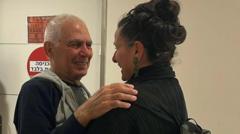As a tentative cease-fire has brought a pause to the conflict in Gaza after 470 harrowing days, residents from both sides of the divide exhibit mixed emotions of elation and trepidation. On Sunday, the long-awaited truce began, signaling a potential end to what has been characterized as the most lethal war the Israeli-Palestinian conflict has witnessed in decades. Amidst the celebrations, fundamental uncertainties loom large.
Gaza Cease-Fire: Cautious Optimism Amid Uncertainty

Gaza Cease-Fire: Cautious Optimism Amid Uncertainty
With a fragile peace in Gaza, locals voice their relief but harbor deep concerns about the future and hostages.
In southern Gaza, Ziad Obeid, a civil servant and a displaced resident, expressed how the cease-fire felt like a weight lifted from his chest. “We have survived,” he said, while lamenting the state of his home, which remains unvisited and damaged for over a year. The bitter questions about reconstruction and future stability weigh heavily on his mind.
In contrast, Dov Weissglas, a former Israeli politician, echoed similar sentiments but turned the focus to the fate of the hostages still held captive in Gaza. “We want to see the hostages home, period,” he declared, signaling a desperate hope for their safe return. Yet, his thoughts also spiral into the difficulties of the situation—he anxiously anticipated the slow release of hostages in exchange for numerous Palestinian detainees, many with life sentences for their actions against Israelis.
Emotions ran high during a rally in Tel Aviv, where hundreds rallied for the release of the hostages, illustrating the widespread anxiety and anticipation that permeates both Israeli and Palestinian communities. Though there is a noticeable sense of relief following the cease-fire, it is undeniably layered with fears, concerns, and a lingering uncertainty about what lies ahead in this fragile peace.
In contrast, Dov Weissglas, a former Israeli politician, echoed similar sentiments but turned the focus to the fate of the hostages still held captive in Gaza. “We want to see the hostages home, period,” he declared, signaling a desperate hope for their safe return. Yet, his thoughts also spiral into the difficulties of the situation—he anxiously anticipated the slow release of hostages in exchange for numerous Palestinian detainees, many with life sentences for their actions against Israelis.
Emotions ran high during a rally in Tel Aviv, where hundreds rallied for the release of the hostages, illustrating the widespread anxiety and anticipation that permeates both Israeli and Palestinian communities. Though there is a noticeable sense of relief following the cease-fire, it is undeniably layered with fears, concerns, and a lingering uncertainty about what lies ahead in this fragile peace.























